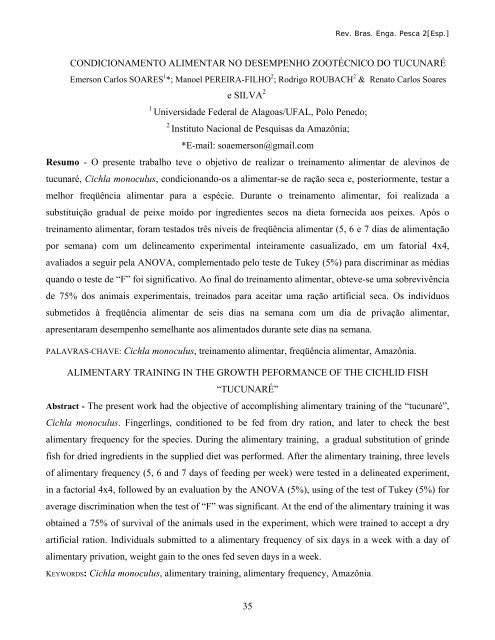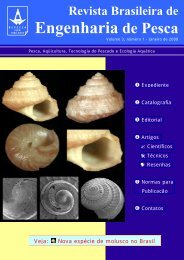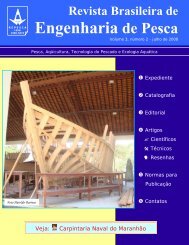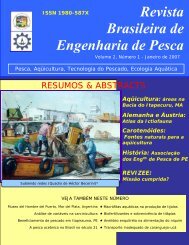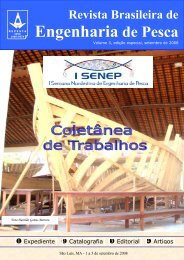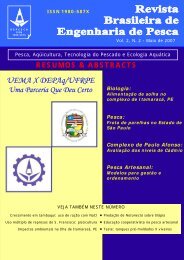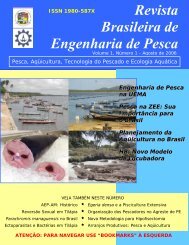Edição Especial - Engenharia de Pesca - Uema
Edição Especial - Engenharia de Pesca - Uema
Edição Especial - Engenharia de Pesca - Uema
You also want an ePaper? Increase the reach of your titles
YUMPU automatically turns print PDFs into web optimized ePapers that Google loves.
Rev. Bras. Enga. <strong>Pesca</strong> 2[Esp.]CONDICIONAMENTO ALIMENTAR NO DESEMPENHO ZOOTÉCNICO DO TUCUNARÉEmerson Carlos SOARES 1 *; Manoel PEREIRA-FILHO 2 ; Rodrigo ROUBACH 2 & Renato Carlos Soarese SILVA 21Universida<strong>de</strong> Fe<strong>de</strong>ral <strong>de</strong> Alagoas/UFAL, Polo Penedo;2Instituto Nacional <strong>de</strong> Pesquisas da Amazônia;*E-mail: soaemerson@gmail.comResumo - O presente trabalho teve o objetivo <strong>de</strong> realizar o treinamento alimentar <strong>de</strong> alevinos <strong>de</strong>tucunaré, Cichla monoculus, condicionando-os a alimentar-se <strong>de</strong> ração seca e, posteriormente, testar amelhor freqüência alimentar para a espécie. Durante o treinamento alimentar, foi realizada asubstituição gradual <strong>de</strong> peixe moído por ingredientes secos na dieta fornecida aos peixes. Após otreinamento alimentar, foram testados três níveis <strong>de</strong> freqüência alimentar (5, 6 e 7 dias <strong>de</strong> alimentaçãopor semana) com um <strong>de</strong>lineamento experimental inteiramente casualizado, em um fatorial 4x4,avaliados a seguir pela ANOVA, complementado pelo teste <strong>de</strong> Tukey (5%) para discriminar as médiasquando o teste <strong>de</strong> “F” foi significativo. Ao final do treinamento alimentar, obteve-se uma sobrevivência<strong>de</strong> 75% dos animais experimentais, treinados para aceitar uma ração artificial seca. Os indivíduossubmetidos à freqüência alimentar <strong>de</strong> seis dias na semana com um dia <strong>de</strong> privação alimentar,apresentaram <strong>de</strong>sempenho semelhante aos alimentados durante sete dias na semana.PALAVRAS-CHAVE: Cichla monoculus, treinamento alimentar, freqüência alimentar, Amazônia.ALIMENTARY TRAINING IN THE GROWTH PEFORMANCE OF THE CICHLID FISH“TUCUNARÉ”Abstract - The present work had the objective of accomplishing alimentary training of the “tucunaré”,Cichla monoculus. Fingerlings, conditioned to be fed from dry ration, and later to check the bestalimentary frequency for the species. During the alimentary training, a gradual substitution of grin<strong>de</strong>fish for dried ingredients in the supplied diet was performed. After the alimentary training, three levelsof alimentary frequency (5, 6 and 7 days of feeding per week) were tested in a <strong>de</strong>lineated experiment,in a factorial 4x4, followed by an evaluation by the ANOVA (5%), using of the test of Tukey (5%) foraverage discrimination when the test of “F” was significant. At the end of the alimentary training it wasobtained a 75% of survival of the animals used in the experiment, which were trained to accept a dryartificial ration. Individuals submitted to a alimentary frequency of six days in a week with a day ofalimentary privation, weight gain to the ones fed seven days in a week.KEYWORDS: Cichla monoculus, alimentary training, alimentary frequency, Amazônia.35


